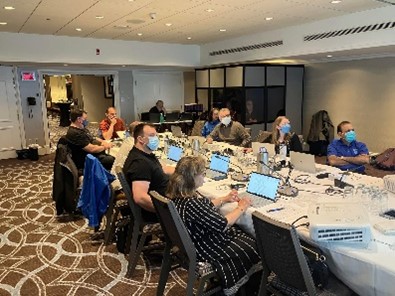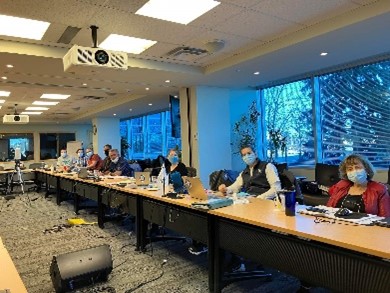SP Executive Newsletter #2
Hello SP Group Members! We would like to welcome in the New Year with you, and provide a few highlights of recent activity for our Group.
Did you get a chance to attend the AGM in November in person, or catch some of the highlights online?
SP Group representation at the AGM

The SP Executive would like to congratulate Judith LeBlanc who is the Institute’s National Steward Officer. Judith is also an SP member, and former member of the SP Executive. We know that she will excel in the position and we are looking forward to working with her!
Judith LeBlanc

The SP Executive would all like to congratulate all of the Stewards of the Year, especially Kevin Jacobs who is a member of our SP Executive. Kevin represents the SP Executive for Prairie / North West Territories, and works for Fisheries and Oceans Canada where he does Arctic Research projects.
Kevin Jacobs

Link to recipients of Steward of the Year Award across Canada: https://pipsc.ca/about/governance/agm/2022/honouring-stewards-year
Also, this is a link to Awards for Outstanding Members of the Institute:
https://pipsc.ca/about/governance/agm/2022/celebrating-outstanding-members
We would like to make special mention of Waheed Khan who is an SP Member and recipient of the Lifetime Membership Award.
Update for the SP Executive
Our last SP Executive meeting was held on November 17th where we prepared for the National AGM, received updates on Collective Bargaining and Navigar.
SP Executive meeting in November

Have you heard about Navigar? This is a new initiative by the Institute to ensure our membership is prepared for career development as the workforce adjusts and keeps up with technological changes. PIPSC received a 2.5 million dollar grant from Future Skills Canada to work on this project. There is a priority to ‘upskill’ our workforce to enhance job security and stay relevant in the job market. More information will be coming for members in the months to come.
Bargaining Update (provided by David Griffin, Negotiator)
Collective Bargaining Q & A - The Arbitration Process
What happens if we reach an impasse in negotiations with Treasury Board?
There are two possible approaches for dispute resolution in the federal government if collective bargaining reaches an impasse after the parties have bargained in good faith – 1) Binding Arbitration or 2) Conciliation with the right to engage in a legal strike.
During the last two bargaining rounds, the SP Group has chosen the conciliation/strike route. For this round of bargaining, the SP Bargaining Team recommended the arbitration option, and the results of the bargaining survey confirmed this recommendation.
How does the bargaining team make the determination that we have reached an impasse?
During the course of negotiations we will endeavour to reach a tentative agreement with the Employer that your bargaining team is prepared to recommend to the membership for approval, through a ratification vote.
In the event that the bargaining team does not reach a satisfactory agreement with the employer, for example if the employer's final offer is not considered to be acceptable to the bargaining team, the bargaining team will report to the Group Executive and members that we have reached an impasse. In determining whether or not the Employer's final offer is acceptable, the bargaining team will consider a number of factors, including the priorities identified by the membership in the bargaining survey, inflation and the Canadian economy, and other labour settlements for comparable employee groups.
What is the arbitration process?
If collective bargaining reaches an impasse after the parties have bargained in good faith, either the Union or the Employer may make an application for arbitration to the Chairperson of the Federal Public Sector Labour Relations and Employment Board. Arbitration can only be requested on the issues unresolved at the bargaining table.
The Arbitration Board consists of either a single member or three members, in our case we would typically request a three person board. The Board would then be composed of one person (nominee) appointed by the Union, one person (nominee) appointed by the Employer, and a Chairperson agreed to by the two nominees. Arbitration Chairpersons are usually lawyers and/or academics with a background in labour relations and established experience as neutral arbitrators.
The Arbitration Board schedules a hearing over one or more days to receive the submissions from both the Employer and Union on the remaining issues in dispute. The Board then meets privately to discuss the submissions and will seek to reach a unanimous decision. Following their deliberations, the Chairperson will issue a written decision, the "Award", detailing the Board's findings on the issues in dispute. The nominees may concur with the Award, or one or both nominees may issue a written "dissent," which is attached to the Award. Dissents have no influence on the implementation of the Award, other than to demonstrate that the decision was not unanimous.
How does the arbitration board reach a decision?
Under the Federal Public Sector Labour Relations Act, the Arbitration Board is required to take into account the following factors, in addition to any other factors that it considers relevant:
1) recruitment and retention;
2) the government’s fiscal circumstances relative to its budgetary policies;
3) internal relativity e.g. compensation for similar work within the public service;
4) external relativity e.g. compensation for similar work outside the public service;
5) compensation and other terms and conditions of employment that are reasonable in relation to the qualifications required, the work performed, the responsibility assumed and the nature of the services rendered; and 6) the state of the Canadian economy.
In addition, replication is one of the primary principles of arbitration for collective bargaining disputes. The replication principle follows the proposition that since interest arbitration is a substitute for free collective bargaining, the award of an arbitration board should replicate the agreement the parties would have made if they had reached an agreement through free collective bargaining.
Replication focuses on objective standards rather than notions of "fairness" or "what is just". Often the best evidence arbitrators will consider is comparative data of agreements reached by the same or a similar Employer with similar classifications of workers. For example, if the arbitration board was considering a dispute over what a hospital should pay its nurses, the freely negotiated rates of pay for nurses at a similar hospital in the same jurisdiction could be compelling evidence for the Arbitration Board.
What are the implications of an arbitration award?
The Board’s award is binding on both parties and is not subject to a vote from the members or approval by the government. Once the Award is issued the Employer and Union are tasked with amending the Collective Agreement to implement the Award. In the event of disagreement on implementation, the parties could return to the Arbitration Board for clarification.
Summary
We enter into bargaining seeking to negotiate the best possible agreement, that your bargaining team is prepared to recommend for ratification by the group membership.
Where this is not possible, arbitration can be an effective way for the parties to resolve a labour impasse, without necessitating job action, strike and a reduction in services to Canadians. Arbitration Boards are required to take into consideration legislated criteria, and will seek to replicate what would have been negotiated had the parties successfully reached an agreement. The evidence submitted by the parties with regards to the statutory criteria, including comparable labour settlements for similar occupations and employers, will be relevant to these considerations.
The SP Group Bargaining Team has been hard at work and meeting regularly with Treasury Board.
SP Bargaining Team meeting in December

Are you concerned about the recent Treasury Board statements concerning return to the workplace?
PIPSC is devoting full attention to this issue and members can be assured that every effort is being made to ensure proper negotiation occurs, and safety of members is protected.
More information and updates can be found here: https://pipsc.ca/news-issues/return-to-workplace
FAQ for return to the workplace: https://pipsc.ca/news-issues/return-to-workplace/faq-returning-to-workplace
SP Group Recognition (provided by Joanne Papineau)
We all know a SP Group member volunteer whose commitment and engagement goes over and above the roles and tasks they are assigned to. It does not have to be someone who has many years of service or is well known amongst peers. Whether you are a steward, executive of an SP Sub-group, member of a Consultation group or advisory committees, etc., this is the “go to” recognition award.
If you wish to nominate someone for this award or have any questions, please contact our Recognition Coordinator, Joanne (jpapineau@pipsc.ca). Nominations can be done throughout the year. A nomination form will be available soon on the SP Group website for your convenience (in the meantime please contact Joanne for criteria).
There are other types of Recognition (SP Group can assist but not under our purview) that you may wish to consult via this link: https://pipsc.ca/about/awards
Are you part of the PC classification of the SP Collective Agreement? Are you aware of your entitlements under clause 18.04(c) for professional development? (provided by Karen Hall and Kevin Jacobs)
PC members have been afforded the right to several Professional Development Days per year (plus some roll over) in our SP Collective Agreement. They exist but many of us don’t know about them or know how to use them. There is discretion in how this PD Leave is used. In general, you should be able to determine what is professional development for you – which does not need to be directly tied to what you to in your job. You should not have to provide significant details for approval. The clause speaks to operational requirements – denial on operational requirements is subjective but there is significant precedence in how it is to be met.
These are a few ways that I have seen PD Leave used over the last few years. It is important to remember that you are only being afforded the leave and that the Employer is not responsible for any costs associated with PD under this clause (c). A couple of examples:
· Although professional designations for scientists in the GoC are not generally recognized, many still maintain their designation. These professional memberships generally requires so many hours or credits of education. Members have used this leave for PD courses and workshops that are required to maintain that designation.
· We have had members take a day to read through current research/journals to keep up to date on their respective field of research
Excerpt from the Collective Agreement:
(c) Notwithstanding paragraph 18.04 (b), subject to operational requirements, a PC employee shall be granted up to twenty decimal six two five (20.625) hours of leave with pay for Professional Development in a fiscal year, for reasons described in paragraph 18.04 (a). Where such leave has not been granted in a fiscal year, the unused leave, up to a maximum of twenty decimal six two five (20.625) hours, will be carried over the following fiscal year. The maximum leave granted in any fiscal year under this paragraph cannot exceed forty one decimal two five (41.25) hours. The leave can be taken in periods of seven decimal five (7.5) or three decimal seven five (3.75) hours.
Upcoming dates to add to your calendar for the new year
SP Group AGM: April 1, 2023 in Toronto
SP Group Western Zonal Meeting: April 15, 2023
SP Group Eastern Zonal Meeting: September 16, 2023
Reading Corner
I am always interested in following news about the labour movement in the media, and this is a great article about what has been happening with unionization of various work groups in BC. Have you heard about the ‘Starbucks Effect’? The support for unionization of workers is definitely increasing!
We look forward to hearing from you,
Tanya Evans, Communications Coordinator
for the SP Group Executive Committee

